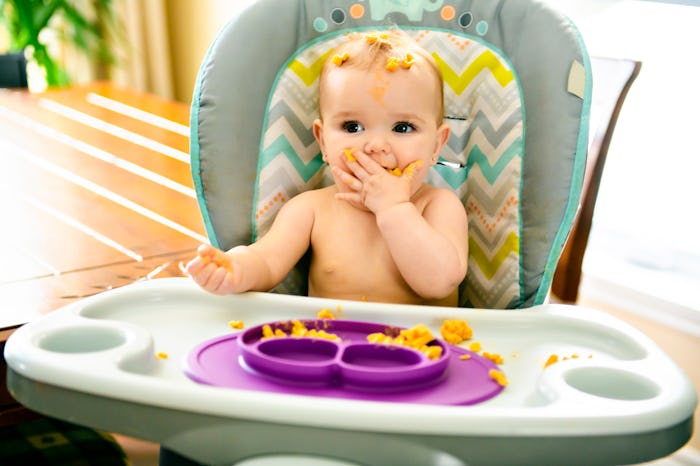Life

Why, Oh Why Must Babies Insist On Smearing Food In Their Hair?
Like so many toddlers, my kid loves to eat and asks for “nack nacks” every hour or so. Like so many more toddlers, he also loves throwing said "nacks" on the floor to the dogs and rubbing them all over his hair. Not his face. His hair. Why do babies smear food in their hair? Typically my son hates it when anything gets stuck to his hands and face and he’ll yell for me to wipe them off quickly. But he thinks it’s great when there’s food in his hair, for some reason, and he always manages to make sure that's exactly where his meal ends up.
“To a baby, food represents more than just stimulation for your child’s sense of taste," pediatrician Dr. Jay Lovenheim tells Romper. “It is something to stimulate the sense of touch, smell, sight and sometimes even hearing. Therefore, it is only natural that your child will treat food like he or she would any new experience and fully immerse themselves in it.”
“Babies are very tactile,” says child development expert Jessica Rolph. “They use their hands, mouth, and other parts of their body to make sense of the world. They love (and need) sensory feedback, and food is great for that; the variety of textures and sensations in food is huge, including temperature, stickiness, smoothness and roughness, dryness and wetness, and so much more.”
In fact, letting them smear food in their hair (and everywhere else) is actually good for your child. “Letting kids get their food everywhere is also a great precursor to self-feeding. Of all that food spread everywhere, some of it is going to find its way into a child’s mouth. To help and support them, you can actually introduce spoons to your child as soon as you start solid foods. Giving a baby access to a spoon early on promotes independence, discovery, and exploration of new foods. You’ll still be spending a lot of time spoon-feeding them yourself and cleaning up messes, but early (and consistent) exposure to self-spooning can really go a long way,” Rolph says.
As far as why my kid loves throwing his food on the floor, Lovenheim says it's a lesson in cause and effect. “Often times, toddlers will throw food on the floor to elicit a reaction from a caretaker or even a pet. This will often evolve into a game for your child to see how often they can sort of manipulate the situation and often you along with it. The food can become the mechanism to get attention from someone.” (That little poot.) "Dropping food to the floor also teaches kids a valuable lesson about gravity," Rolph adds. "It can be hard to watch our kids get so messy, but try to avoid constantly wiping them (and the table and floor) down if possible — it can sometimes backfire, teaching the message that sensory exploration is to be avoided and that nothing can be messy.”
In addition to helping your baby learn to self-feed, there's another huge benefit to letting your kid play with their food, according to Lovenheim. Kids who are allowed the freedom to smear food in their hair learn that mealtime is a positive experience. “It’s okay to have some basic rules and limitations regarding acceptable behavior for a small child at mealtime. However, it’s just as important for a child to equate eating with a positive experience. Letting a child have fun while they are eating will result in them looking forward to eating,” Lovenheim says. “I also strongly encourage eating at the same time as the rest of the family. The social interaction of a household eating, talking, and socially engaging with each other does wonders for stimulating your child’s own language and social skills.”
So how long do we have to plan to bathe our babies after every meal to get all of that food out of our baby’s hair? Lovenheim says that while every baby is different in how they mature, “typically once your child is eating more finger foods, they begin to get a larger percentage in their mouths as opposed to their hair and clothing.”
At least they're learning, right? Silver linings, people.
Experts:
Dr. Jay Lovenheim of Lovenheim Pediatrics in West Orange, New Jersey.
Jessica Rolph co-founder and CEO of Lovevery.